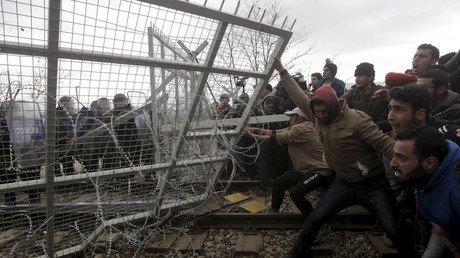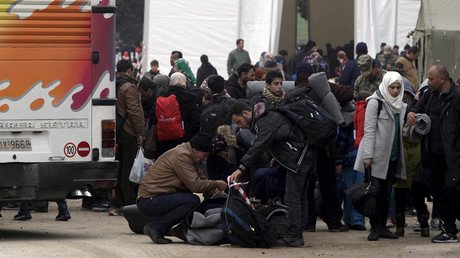Austria is not Germany's ‘distribution hub’ for refugees – Chancellor Faymann
Austrian Chancellor Werner Faymann has blamed Germany's open door policy as well as a lack of cooperation between EU member states on the refugee crisis and has said that Austria will no longer be a ‘distribution hub’ for refugees.
Faymann shifted the responsibility for tackling the refugee crisis on Germany by saying that it “should set up a daily quota and then bring these refugees directly from Greece, Turkey or Jordan," as he gave an interview to the Austrian Kurier on Tuesday.
The situation where “several thousands of people are waved through every day, and, on the other hand, Germany informs us that today it will only allow 1,000 or 2,000 into the country,” is not acceptable for Austria any more, he told Kurier.
"Austria cannot and must not become a distribution hub [for refugees]. There must be an end to that," Faymann added, stressing that “last year, Austria accepted 90,000 asylum applications, which is more than Germany in per capita terms.”
During the interview, he once again said that refugees should have been distributed between the EU member states on the external border of the Union, in Greece and Italy.
“If all the [EU] states [accepted refugees] depending on their population, we could have offered shelter in Europe to two million people,” he said.
On Monday, the same idea was voiced by the Austrian Defense Minister Hans Peter Doskozil, who said that, if Germany does not want to introduce a quota on refugees, it should “bring them directly from Greece to Germany,” German Die Welt reports. Doskozil also said that Germany “greatly profits from the border control measures introduced by Austria…”
Austria ‘does not believe’ in a European solution to the refugee crisis.
The country’s strict measures toward refugees are driven by two factors, Gerhard Mangott from the Innsbruck University told RT.
“First of all, the government understands that the culture of welcoming or at least accepting refugees has changed in the country. Now we have the culture of anxiety and unease about the huge numbers of refugees that come to Austria,” Mangott told RT.
“This sentiment in public encourages the right-wing parties, and the government is very much afraid of losing… votes to these right-wing challengers, particularly as the presidential elections are ahead,” he added.
Germany may soon start turning refugees away at its borders https://t.co/jmOYUx9XOtpic.twitter.com/stBCCDM6KF
— RT (@RT_com) March 2, 2016
“Secondly, the government no longer believes in the European solution,” he said adding that Austrians had long supported the idea of distributing the refugees among the EU member states but that plan never worked.
“Austria does not believe it will work in the future, so the government [takes] measures that keep refugees out of Austria,” Mangott added.
‘Germany does not use daily quotas’
Faymann’s suggestions to Germany were sharply criticized by German Chancellor Angela Merkel.
"Anyone who closes national borders doesn't do anything against the causes for the refugee movement," Merkel shot back, referring to Austria's new harsh refugee policy. She also said that the countries closing its borders risk damaging the European economy in the long term.
"We have to find sustainable solutions that we will still be able to justify tomorrow. Above all, [we need] solutions that don't set up something on one side that other countries simply have to deal with," she added.
“Germany does not use daily quotas,” German government’s spokesman Steffen Seibert told journalists on Wednesday stressing that European countries should jointly deal with the initial causes of the refugee crisis as well as strengthen the EU external borders and actively cooperate with Turkey.
Germany is looking to an EU-Turkey summit in Ankara on March 7 to make headway with bringing the refugee flow under control.
Werner Faymann expressed skepticism concerning the potential success of the summit in the interview to Kurier and said that, if the summit fails, Angela Merkel’s ‘plan B’ could consist of just letting refugees continue to come freely to Europe. “This is an unacceptable plan,” he said.
The EU strategy of dealing with the refugee crisis advocated by Germany is too “focused on Turkey,” on keeping refugees in Turkey and on “keeping them from migrating to Greece,” Gerhard Mangott from the Innsbruck University told RT.
However, “this will work only, and that is Turkey’s position, if Europe takes refugees from Turkey directly to EU member states. And that… does not work within the European Union. No state wants to accept contingencies of refugees coming from Turkey, Jordan and Lebanon,” thus they resort to individual measures against the refugee stream, he said.














